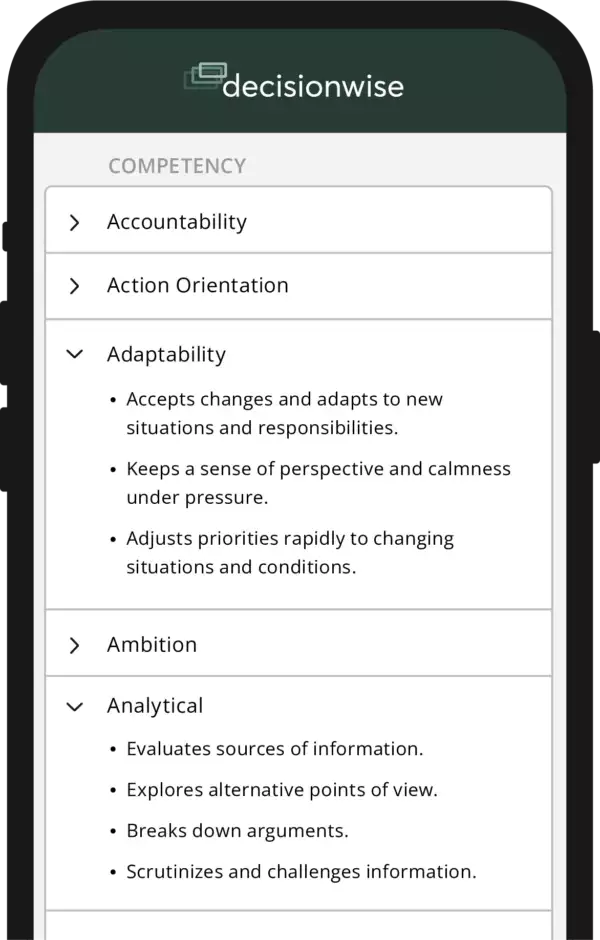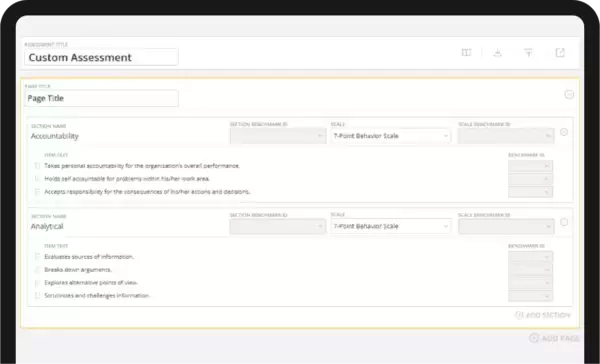Effective 360 Feedback Competencies & Leadership Assessments
Explore DecisionWise for comprehensive 360-degree feedback assessment surveys tailored to 80 research-backed leadership competencies, influencing over 320 behaviors. Refined over 25 years, our competencies resonate globally, delivering actionable insights. Each competency features four observable and actionable behavioral statements, fostering effective leadership development worldwide.
Discover DecisionWise’s unparalleled 360-degree feedback survey solutions, including highly effective pre-defined assessments recognized as industry leaders. With the trusted brand, Leadership Intelligence®, our assessments ensure top-tier quality and reliability. Choose DecisionWise for the pinnacle of organizational effectiveness and leadership development in every product and assessment bearing our esteemed brand.
Use our Foundational Leadership Competencies to Measure What Matters Most
DecisionWise’s 360 Degree assessments include three foundational competencies, which each have several sub-competencies:
Getting Results
- Professional Expertise
- Results Orientation
- Empowerment
- Accountability
- Customer Focus
Leading Change
- Organizational Alignment
- Change Management
- Collaboration
- Innovation
Engaging People
- Wellness
- Interpersonal Communication
- Developing Others
- Psychological Safety
- Engaging
Each 360 feedback statement helps measure where an employee scores within the competency framework.


What is a 360 Degree Feedback Behavioral Statement?
Explore DecisionWise’s 360-degree feedback survey process, where behavioral statements align with successful leadership outcomes. Our platform, preloaded with impactful statements, facilitates multi-rater assessments. Participants receive ratings on behavioral alignment, generating comprehensive feedback reports. Gain insights into competencies and aggregate scores effortlessly for informed leadership development.
Actionable 360 Feedback Questions for Company Culture Surveys
Optimize leadership growth with DecisionWise’s 360-degree feedback questions. Our actionable assessments empower individuals to take informed action based on scores. For instance, if a leader scores low on accountability, they can set targeted goals for improvement. Experience effective evaluation, moving beyond general expectations for enhanced leadership development.
Identifying Leadership Derailers in 360 Degree Feedback
A DecisionWise Leadership Intelligence® Assessment also measure leadership derailers using a separate section from our normal leadership competencies. A leadership derailer is a behavior that gets in the way of a leader’s effectiveness, and is often an over-used strength. You can recognize a derailer using these four criteria:
• A derailer has the potential to limit our progress
• Sometimes, a derailer can be linked to a talent taken to an extreme
• Multiple strengths cannot compensate for a derailer
• Others tend to focus on and emphasize our weaknesses
Enhance your 360-degree feedback insights with DecisionWise. Don’t overlook vital aspects without a derailers section, crucial for a comprehensive leadership evaluation. Our derailers measure emotional intelligence and interpersonal skills, revealing the ‘how’ behind results. Ensure effective leadership, evaluating not just KPIs, but also team retention. Explore our 360 Feedback solutions now.
Recognizing Common Leadership Derailers in 360 Feedback
Based on years of research and experience, we have identified thirteen of the most common leadership derailers. These include:
LACKS FOCUS
Easily distracted; shifts from task to task without getting the most critical things done.
NOT TRUSTED
Violates or compromises the trust of others; has difficulty gaining the trust of others.
CLOSED-MINDED
Is closed to new ideas; not open to constructive feedback; unwilling to consider other viewpoints.
NOT A TEAM PLAYER
Selfish; places personal agenda before the good of the team.
MICROMANAGER
Overly controlling; does not empower others with the freedom and latitude to do their best work.
EAGER TO PLEASE
Overly concerned with being accepted and liked; defers to other people’s opinions.
DISENGAGED
Appears bored or dissatisfied with work; does just enough to “get by.”
VOLATILE
Loses his/her temper; loses patience quickly; irritable and lacks composure.
PERFECTIONIST
Fails to recognize when something is “good enough;” obsessive; uncompromising.
Partnering with DecisionWise
For over 25 years, DecisionWise has helped organizations, teams, leaders, and individuals create competency-based cultures that drive success. Our 360 Degree Feedback software platform and validated assessments provide unmatched quality in helping individuals to make meaningful improvements.
